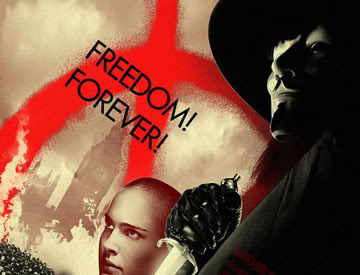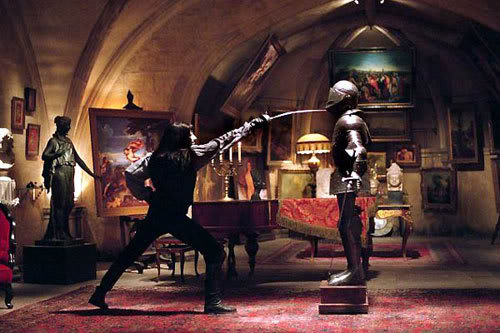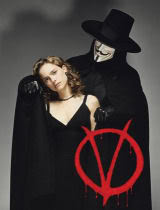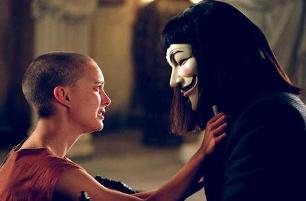MOVIE ANALYSIS: V for Vendetta, Part 2
By Kathleen Bolton | January 9, 2007 |
 Yesterday Therese and I dished about the totalitarian-themed film V for Vendetta (just a short scroll down). Our talk yesterday examined the role of the two protagonists Evey and V. Today we move our analysis to the way the filmmakers handled the controversial theme, which is that one person’s terrorist is another person’s freedom fighter.
Yesterday Therese and I dished about the totalitarian-themed film V for Vendetta (just a short scroll down). Our talk yesterday examined the role of the two protagonists Evey and V. Today we move our analysis to the way the filmmakers handled the controversial theme, which is that one person’s terrorist is another person’s freedom fighter.
Kath: This movie was pretty unapologetic on the political front, no?
Therese: Yes–the total control; it was frightening because it’s also plausible. I also thought the parallels to 9-11 were eerie. Their “chosen date” was November 5th, their goal to destroy a government building to make a statement: Blowing up a building can change the world. It stunned me to realize this plot was conceived before 9-11.
Everything about this movie was big, impossible to miss. The violence was stylized, the themes and messages broadcast (sometimes literally) for the viewer to digest. It’s an interesting technique, and it is one that feels derived from politics: Make sure that everyone GETS the intended message. (A side note: I happened to watch this movie the night Saddam Hussein was executed; how odd is that?) I think its a gamble a writer makes when their reader or viewer can be put off by such heavy-handedness with references to things that strike such a raw chord with people, but its clear your statement is heard in the end.
What do you think about this gamble? Where should the writer draw the line?
Kath: Ugh, the night Saddam was executed? That is creepy.
 I think the risk to lean on the political implications paid off, at least it did for me. There was just enough plausibility in each scenario to make you think “this really could happen” like the biological virus gone amok and the government using it to justify repression even though they were the ones who created it. So I understood and empathized with V’s motivation to blow up Parliament. What limit does it take, the movie asks, before one gets outraged enough to do violence? What happens when children heed the call for “freedom”? What is freedom anyway–can anyone be free if the cost is so much bloodshed?
I think the risk to lean on the political implications paid off, at least it did for me. There was just enough plausibility in each scenario to make you think “this really could happen” like the biological virus gone amok and the government using it to justify repression even though they were the ones who created it. So I understood and empathized with V’s motivation to blow up Parliament. What limit does it take, the movie asks, before one gets outraged enough to do violence? What happens when children heed the call for “freedom”? What is freedom anyway–can anyone be free if the cost is so much bloodshed?
For me also what rang true was the passive populace sated by t.v. and consumerism. I think the filmmakers handled that aspect brilliantly, as they did with the blowhard agitprop t.v. commentator who was revealed to be a hypocrite of the greatest magnitude. I did love that last frame, where everyone had their V masks on….we’re all terrorists. That was very cool. What did you think about the ending?
Therese: The touch with the masks was brilliant, really–the idea that none who wear them are individuals, that they’re the keepers of the idea and the passion for freedom. Interesting, too, that the investigator seemed sold on V’s vendetta in the end, allowing the train its final run as he and Evey stood watching.
I also enjoyed seeing Evey’s character arc go full circle – she moves from a fearless girl who hides under the bed to a leader who stands firm on her decisions and who is persuasive enough to convince others that she is in the right. What did you think about Vs method of creating a fearlessness in Evey? Torture or therapy?
 Kath: This is the part of the movie I had the most trouble with. I felt cheated when I learned it was V who had imprisoned Evey and tortured her instead of the repressive regime. I’m okay with blurring lines between heroism and villainy, but that twist undercut much of my sympathy for V. I understand why they (or Alan Moore) did it, but it left a bad taste in my mouth. If Evey had survived torture at the hands of the regime instead of V, it would have still served the same storytelling purpose, imo. You?
Kath: This is the part of the movie I had the most trouble with. I felt cheated when I learned it was V who had imprisoned Evey and tortured her instead of the repressive regime. I’m okay with blurring lines between heroism and villainy, but that twist undercut much of my sympathy for V. I understand why they (or Alan Moore) did it, but it left a bad taste in my mouth. If Evey had survived torture at the hands of the regime instead of V, it would have still served the same storytelling purpose, imo. You?
Therese: I honestly predicted that it was V’s lair before the revelation (the gloves gave it away for me). Again, I think it goes back to V being parental and trying to actively mold Evey in his image. He had suffered before his transformation and so she had to as well. Interesting when they juxtaposed each of their defining moments on the screen – him in the fire and her in the rain. I’m still trying to work out the symbolism there. Maybe the idea was that his transformation was born from hate and hers from (supposed) love? I dunno.
I don’t think I ever liked or disliked V throughout the film. It seemed to me more something to just take in and think about. Did you even see a character arc for V? I don’t think I did, which is curious! Maybe again it’s because he’s not a character as much as an idea that remains steady throughout the film. Thoughts?
Kath: Gosh, I didn’t think of V that way, but that’s a pretty insightful analysis. I thought his arc was that Evey touched him emotionally–he seemed to feel bad that he tortured her–but in the end his devotion to humanity overcame his attachment to her. Thus he resisted being unmasked. At least that’s how I interpreted it. But it was a pretty weak arc at best.
 Therese: Let’s talk about Valerie! I told my hubby toward the end of the film, “I think V is Valerie.” He puckered his face in that way that means, “Are you on drugs?”, and even though by the end of the movie I had disregarded my theory, there is perhaps the smallest possibility. They never showed her death, and it was interesting that she essentially left a letter for Evey that helped pull her through those blackest moments. In their unforgiving world, Valerie was condemned for being a homosexual. She wrote: “…but for three years I had roses and apologized to no one. Every inch of me shall perish but one. An inch. But worth having. Never let them take it from us.” and “Even though I don’t know you, I love you with all my heart.” Interesting, no?
Therese: Let’s talk about Valerie! I told my hubby toward the end of the film, “I think V is Valerie.” He puckered his face in that way that means, “Are you on drugs?”, and even though by the end of the movie I had disregarded my theory, there is perhaps the smallest possibility. They never showed her death, and it was interesting that she essentially left a letter for Evey that helped pull her through those blackest moments. In their unforgiving world, Valerie was condemned for being a homosexual. She wrote: “…but for three years I had roses and apologized to no one. Every inch of me shall perish but one. An inch. But worth having. Never let them take it from us.” and “Even though I don’t know you, I love you with all my heart.” Interesting, no?
Kath: Ok, THAT never occurred to me! I kept thinking she was going to pull a key or something that Valerie had hidden in the toilet. But I’m intrigued by the idea. Having V be a female would have made those ass-kicking moves that much more awesome. I also loved this story-within-a-story about Valerie. I think it’s a strong technique that can inject other dimensions of emotion that would be hard to fit in otherwise.
My final thought on the film is it shows that risky storytelling can pay off, but it takes a light touch. V and Evey’s end were certainly appropriate–he dies for freedom, she lives to continue the fight. I think if they’d let V live it would have lessened the impact of the ending. It showed how far he would go to obtain his goal. In the end, the stylish visuals and intriguing plotline saved the story from absurdity, at least for me. You?
 Therese: I wondered over V’s end, because his actions seemed suicidal to me. He could’ve pulled out his knives and knocked out half the force before being shot; he may have lived. But as he left Evey before going to his death he essentially said goodbye to her; he knew what the end result would be. If he hadn’t died then, I wonder if he would’ve rode the “train to freedom” in the end anyway? I think he was ready for it to be over.
Therese: I wondered over V’s end, because his actions seemed suicidal to me. He could’ve pulled out his knives and knocked out half the force before being shot; he may have lived. But as he left Evey before going to his death he essentially said goodbye to her; he knew what the end result would be. If he hadn’t died then, I wonder if he would’ve rode the “train to freedom” in the end anyway? I think he was ready for it to be over.
Anywhoo, I’m ultimately glad that I took the time to see V for Vendetta. It was as edgy, bizarre and unboxed as it looked in the trailer I saw eon’s ago, and it kept my mind clicking at extra speed while I was on the ride. How ’bout you? Glad you saw it?
Kath: I was. The filmmakers took the box and blew it up (pun intended). It gave me a lot to think about as far as storytelling goes. I look forward to the next offering from the Wachowski brothers. It’s sure to be surreal and thought-provoking.









They do show Valeries death, you see her body chucked into the pile of corpses.
However I also thought V was a lesbian who had a sex change – hahaha
Thanks, Blaec! I missed that scene…
There is a lot more symbolism hidden in the movie than most people think. What about the roses? I personally think the roses symbolize the character of V. The type of roses he uses is supposedly exctint, yet V grows them. I think that is really symbolic of the fact that in order for a totalitarian government to work, the oppressed people must be submissive. But then there is V, although people like V are not supposed to exist in a government. Hence, the ‘extinct’ roses. And there’s so much more, I wrote a whole term paper on it.
very intresting conversation i liked the way yall dissected the movie into pieces to me the movie was great regardless of whether he lived or not or whether the regime torchered the girl or not…the main idea of the story was still delivered greatly in the end